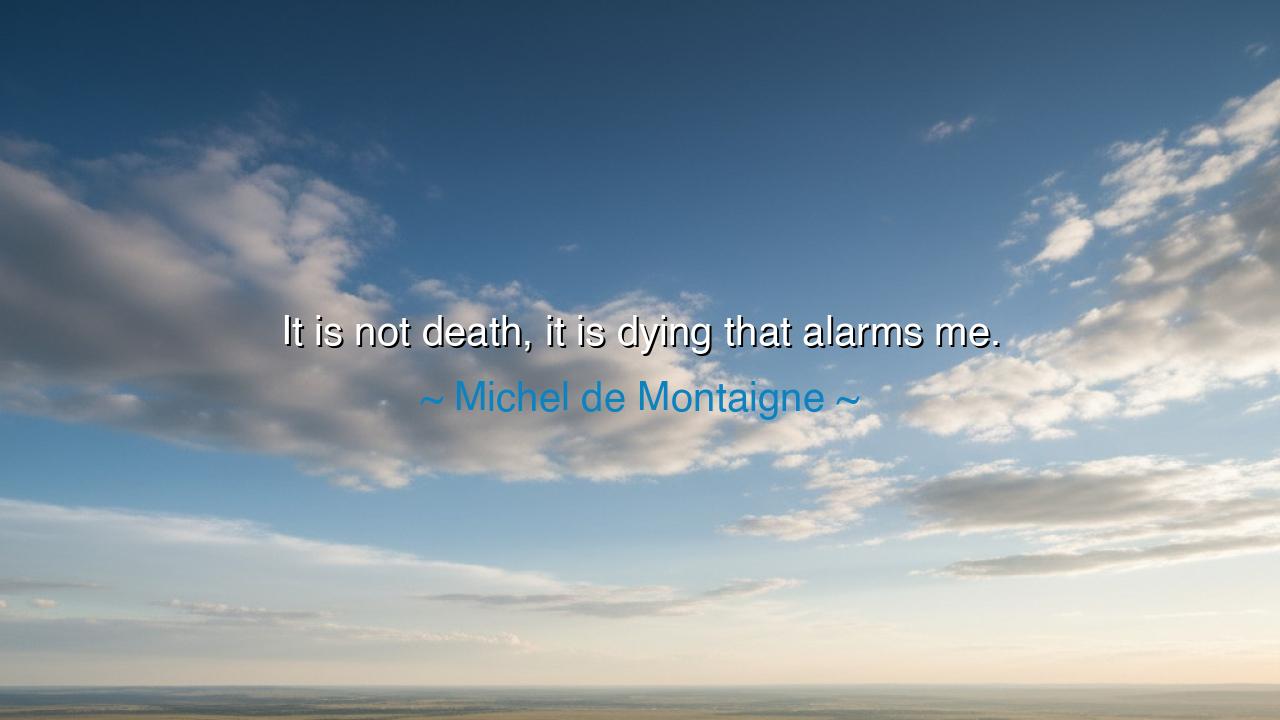
It is not death, it is dying that alarms me.






Michel de Montaigne once wrote: “It is not death, it is dying that alarms me.” In this brief but profound reflection, the French philosopher captured one of the deepest truths of the human condition. Death itself — the moment when life ceases — is still and silent. It is the mystery that comes after the final breath. But the act of dying, the passage between life and death, is what fills the heart with dread. Montaigne, who devoted his life to understanding human nature through observation and introspection, was not afraid of the unknown beyond death; rather, he feared the pain, the loss, and the slow surrender that accompany the dying process. His words echo across centuries, for every soul who has looked mortality in the eye knows this trembling distinction.
The origin of this quote can be found in Montaigne’s Essays, one of the great works of Renaissance philosophy. Living in a time of plague, war, and social unrest, Montaigne often pondered mortality — not from a place of despair, but from a desire for peace and understanding. He wrote as a man who had seen death in many forms: sudden and gentle, violent and quiet. Yet what unsettled him most was not the inevitability of death, but the uncertainty of the journey toward it. How will it come? Will it be swift or slow? Will the body betray the spirit before the spirit is ready to depart? In these questions, we hear not the voice of a philosopher detached from emotion, but of a man confronting his own humanity with honesty and humility.
“It is not death, it is dying that alarms me.” These words pierce the illusion that we fear death itself. Most of us, Montaigne suggests, do not truly fear the end — we fear the suffering that might precede it. The process of dying — the loss of strength, the dimming of the senses, the surrender of control — offends our instinct for life. We are beings who crave motion, breath, and will. The thought of our bodies weakening, of our minds slipping into silence, stirs a primal unease. Death is an instant, but dying is a journey — and it is the journey that tests our courage.
Consider the story of Socrates, who faced his death with calm acceptance. Condemned to drink hemlock, he spoke serenely to his students about the immortality of the soul. He showed no fear of death, but even he confessed discomfort at the thought of dying — the physical process of the poison creeping through his body, numbing his limbs, freezing his breath. Yet in that moment, Socrates embodied the wisdom Montaigne speaks of: he separated death, which is beyond our control, from dying, which challenges our spirit. His peace lay in acceptance, in the recognition that though the path to death may be painful, the destination itself is release.
There is a paradox in Montaigne’s reflection. For while dying frightens us, it is also what gives death its meaning — and life its urgency. The fear of dying reminds us that life is precious, that every moment of health, of laughter, of love, is a fragile miracle. In the awareness of our mortality lies the seed of wisdom. To meditate on death, as Montaigne did, is not morbid; it is to understand life more deeply. The one who accepts the reality of dying learns to live with intensity and grace, free from the illusion of permanence.
In our age, where medicine and technology strive endlessly to delay death, Montaigne’s words ring even louder. We fight the dying process, not out of love for life, but out of terror of loss. Yet there is dignity in embracing mortality — in preparing the heart for the inevitable with serenity, rather than fear. The ancients called this memento mori — “remember you must die.” But they did not say it to darken life; they said it to make it luminous. To live with the awareness of dying is to live awake, to cherish the fleeting beauty of existence, and to release bitterness, vanity, and haste.
Let this, then, be the lesson: do not waste your days fearing death. It will come, as it comes to all, quietly or swiftly, but beyond your command. Instead, learn to make peace with the thought of dying. Strengthen your spirit, so that when the body fails, your heart remains calm. Seek not to escape mortality, but to transcend fear. Live so fully, so consciously, that when the time comes to die, you will have nothing left unfinished within you.
For as Montaigne teaches, death is not the enemy — fear is. When we make peace with the act of dying, we are freed to live without dread. And when that day arrives, we will meet it not with alarm, but with the quiet dignity of one who has loved life well, and who greets the end as an old friend, long awaited, come to lead us gently into eternity.






AAdministratorAdministrator
Welcome, honored guests. Please leave a comment, we will respond soon